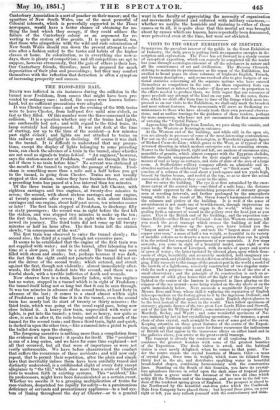THE BLOOD-RED RAIL.
DEATH was inflicted in six instances during the collision in the tunnel near Frodsham, from causes that might have been pre- vented by ordinary care ; indeed, the causes were known before- hand, but no sufficient precautions were adopted.
It was Chester race-time ; and on the evening of the 30th trains were to leave Chester, from half-past five until nine o'clock, as fast as they filled. Of this number were the three concerned in the collision. It is a question whether any of the trains had lights, one confessedly had not ; and with regard to the third train, its lamp certainly had disappeared. It was not dark at the time of starting, nor up to the time of the accident—a few minutes past eight o'clock ; and lights are not attached to trains on this railway until daylight is declining. Of course it was dark in the tunnel. It is difficult to understand that any precau- tions, except the display of lights belonging to some preceding train, can check the advance of a train in the tunnel, since whistles are not used as signals to trains behind. " An engineer," however, says the station-master at Frodsham, " could see through the tun- nel if there is no train before him." No servant was stationed at the mouth of the tunnel to regulate the passage of trains. Frod- sham is something more than a mile and a half before you get to the tunnel, in going from Chester. Trains are not usually stopped at this station, unless they have business there, or unless a preceding train has passed at a less interval than ten minutes.
Of the three trains in question, the first left Chester, with eighteen carriages and two engines, at twenty-five minutes to seven; the second, with about sixteen carriages and one engine, at twenty minutes after seven ; the last, with about thirteen carriages and one engine, about half-past seven, ten minutes sooner or later ! The first train stopped at Frodsham, to discharge fifty or sixty passengers ; the second was in sight before the first left the station, and was stopped two minutes to make up the ten ; the first train, however, was still in sight when the second re- newed its journey. The third train did not come up till twenty minutes or half an hour after. The first train left the station slowly,"in consequence of the wet."
The first train was observed to enter the tunnel slowly; the second also; the third at a rapid though not excessive pace.
It seems to be established that the engine of the first train was not supplied with water; and in the tunnel, after labouring for a time at a slow pace, it came to a stand. The tunnel was soon filled with steam and smoke ; but, perhaps because it was dark, the fact that the sight could not penetrate the tunnel did not ar- rest the driver of the second train ; which entered, and struck against the first, though not violently ; almost immediately after- wards, the third train dashed into the second, and there was a fearful shock, with a terrible infliction of death and wounds.
Now observe here is a train, heavily laden, with two engines but no water, stopped in a tunnel which is in sight of Frodsham ; the tunnel itself being not so long but that it can be seen through. It was ten minutes in advance of the second train, at least forty in advance of the last ; it comes to a stand almost within sight of Frodsham ; and by the time it is in the tunnel, even the second train has nearly lost its start of twenty or thirty minutes ; the third train, which was going at the usual rapid pace, being now close behind it. A heavy slow train, unprovided with water or lights, is put into the tunnel; a train, not so heavy, nor quite so slow, is sent in after it, the rails being sanded at the mouth of the tunnel for the second train ; and then a third train, light and quick, is dashed in upon the other two,—like a ramrod into a pistol to push the bullet down upon the charge.
The foregoing narrative is nothing more than a compilation from the evidence at the inquest : it speaks for itself. The " accident " is one of a long series, and we have for some time explained—not all that occurred, but all that were of importance or were not really unforseeable. We have before characterized the conduct that suffers the recurrence of these accidents ; and will now only repeat, that to permit their repetition, after the plain and simple laws that inevitably induce them have been carefully traced and distinctly understood, is a coldblooded slight of every duty except allegiance to "the till," which does more than a score of Chartist riots to weaken faith in existing systems. This "accident," like its predecessors, might have been forecalculated as a certain event. Whether we ascribe it to a grasping multiplication of trains for race-visitors, despatched too rapidly for safety—to a parsimonious deficiency of servants and precautionary appliances—to a bad sys- tem of timing throughout the day at Chester—or to a general want in the faculty of appreciating the necessity of organization and movements planned and enforced with military exactness,— whether we ascribe the homicide and maiming to either of those causes or to all, it is quite clear that this mortal act was brought about by causes which are known, have repeatedly been denounced, were perceived even at the time, but were not obviated.


























 Previous page
Previous page